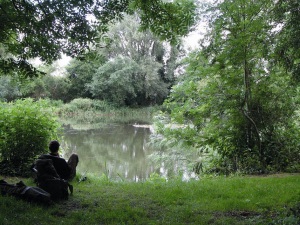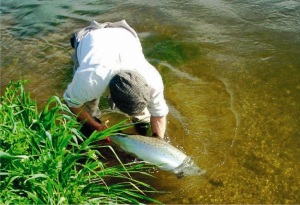You are here
Wessex Chalk Stream & Rivers Trust
WCSRT is a charity, dedicated to the guardianship, protection, enhancement and maintenance of healthy, functioning ecosystems within the river corridors and catchments of the Wessex region.
Our vision is of healthy rivers which are valued and nurtured by the community and which exhibit:
- Sustainable and naturally abundant wildlife
- High water quality and sustained natural flows
- Fully functioning ecosystems which link the rivers with their valleys
- Resilience to climate change and future stresses associated with social and economic development.
Pressure from agricultural, aquaculture, transport and housing development in the region has placed significant strain on the river environment over the last half-century or so. River channels have become degraded through dredging for agricultural ‘improvement’ and engineering for flood management. Flows have been impaired by abstraction for public water supply. Water quality continues to be impacted by agricultural run-off, pesticides, discharges from watercress beds, fish farms, sewerage systems, and septic tanks. Spawning gravels continue to be affected by siltation. Aquatic fly life has seriously declined. The numbers of salmon running to spawn are gravely depleted. Native Crayfish have been virtually wiped out and non-native species are threatening the integrity of the habitat.

Predictions of future climate change and population growth suggest that environmental stresses will increase significantly over the next 50 years, particularly those associated with river flows, and water quality.
The Wessex Chalk Stream and Rivers Trust was formed by a group of like-minded people from organisations with an interest in protecting these fragile river habitats. They recognised that many of the environmental challenges faced are common across the region and that in most cases addressing them demands a catchment based perspective, which considers all aspects of the ecosystem together. These organisations included the Wiltshire Fishery Association, the Avon and Stour Association, the Test and Itchen Association, the Wessex Salmon and Rivers Trust, the National Trust, the Hampshire Wildlife Trust and the Wiltshire Wildlife Trust.
The rivers of the Trust region stretch from the delightful little River Meon in the east, to the Dorset Stour in the west. They include the River Itchen with its headwater streams the Candover, Alre and Tichborne; the River Test including the Bourne Rivulet, Dever, Wallop and Dun.
The Hampshire Avon rises from the chalk of the Salisbury Plain and includes the Wiltshire Bourne and the Rivers Wylye, Nadder and Ebble.
It winds its serpentine way south through north Wiltshire into Hampshire where it collects the acid waters of the New Forest Streams such as Hucklesbrook, Dockens Water and Lynbrook.
These are important sea trout spawning streams. Eventually it meets the River Stour at Christchurch in Dorset to run into the sea at Mudeford.
Most of these rivers are ‘chalk streams’ and as such are internationally unique, only occurring in Southern Britain and northern France, but they also include important non-chalk rivers such as the Dorset Stour rising in Dorset and the upper part of the River Nadder running off the blue clay. They are of outstanding conservation value as habitat for rare, important and sometimes endangered species such as the Southern Damsel Fly, Atlantic salmon, sea trout, Eels, Otters, Lamprey, Brown Trout and the tiny Desmoulin’s Whorl Snail. Two carry the highest level of European protection, as ‘Special Areas of Conservation’ (SAC) designation and three are designated ‘Sites of Special Scientific Interest’. They are of national and international important, even iconic, recreational and environmental value to many thousands of anglers, naturalists and conservationists, both local and visitors.
 The Test is arguably the birthplace of fly fishing for trout and, to this day, is one of the most important river trout fisheries in southern England. It is also host to improving runs of North Atlantic salmon. These are much sought after by local and visiting sporting anglers happy to return their quarry after the joy of the catch. Come winter and the superb grayling fishing comes to the fore with specimen fish caught every year.
The Test is arguably the birthplace of fly fishing for trout and, to this day, is one of the most important river trout fisheries in southern England. It is also host to improving runs of North Atlantic salmon. These are much sought after by local and visiting sporting anglers happy to return their quarry after the joy of the catch. Come winter and the superb grayling fishing comes to the fore with specimen fish caught every year.
A few miles to the east is the River Itchen, smaller than its neighbour but as important and rewarding to the sporting angler seeking superb trout fishing in pristine surroundings. This river too, in their season has salmon and the grayling ever present to reward the skilled angler.
The SAC River Hampshire Avon, for thus it is named, whilst spending much of its time in Wiltshire and Dorset, is a bigger river than either the Test or Itchen. The ‘five rivers’ that are the source support well managed trout and grayling fisheries largely conserved and managed by a number of clubs and associations.
Below Salisbury it is renowned for the quality and diversity of the miles of coarse fishing available throughout the length to the famous Royalty Fishery at Christchurch.
Every year one or two barbel of fourteen pounds are reported, a rare roach of three pounds and chub in excess of seven pounds are not too unusual.
The many lakes in the catchment, largely mature gravel workings, produce numerous carp, up to 40 pounds in one or two cases, tench and the fittest of bream. This river is host to a tremendous roach restoration project, the brainchild of Budgie Price and Trevor Harrop, who introduce hundreds of thousands of juvenile Avon fish, that they have raised, throughout the river annually.
Avon salmon were once prolific and often huge, sometimes over 40 pounds at the turn of the century and the early 1900’s ,and thousands of fish entered the river at Mudeford Harbour. Sadly, in keeping with salmon rivers as a whole, the numbers are slow to recover. Fighting fit, if infrequent, two and three winter fish continue to enter the river. A fish estimated at 30+ pounds was caught last year and a few fish in the high twenties have been caught in February and March of this year.
The River Stour, rising in Dorset and joining the Avon at Christchurch, also offers superb coarse fishing throughout the length. Sadly the once famous salmon run is no more with a very few fish being seen now.
Much of this superb angling is managed by Christchurch Angling Club. (www.christchurchac.org.uk) and Ringwood and District AC (www.ringwoodfishing.co.uk)
Fishing is available to the visiting angler with day tickets available from tackle shops in the areas, for example: Avon Angling, (www.avonangling.co.uk) and Ringwood Tackle in Ringwood (www.ringwoodtackle.co.uk), Davis Tackle, (www.davistackle.co.uk) in Christchurch and others.
